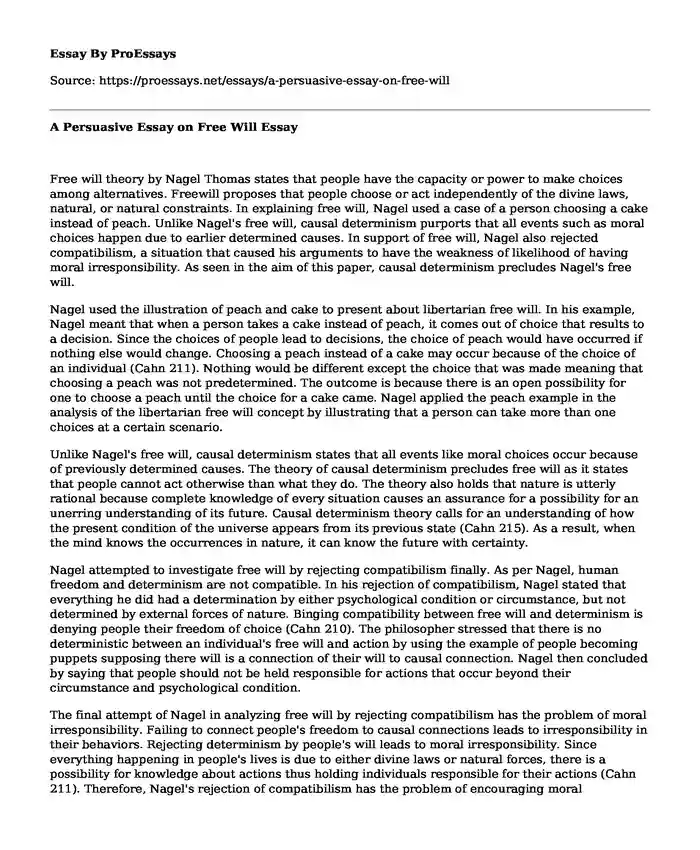Free will theory by Nagel Thomas states that people have the capacity or power to make choices among alternatives. Freewill proposes that people choose or act independently of the divine laws, natural, or natural constraints. In explaining free will, Nagel used a case of a person choosing a cake instead of peach. Unlike Nagel's free will, causal determinism purports that all events such as moral choices happen due to earlier determined causes. In support of free will, Nagel also rejected compatibilism, a situation that caused his arguments to have the weakness of likelihood of having moral irresponsibility. As seen in the aim of this paper, causal determinism precludes Nagel's free will.
Nagel used the illustration of peach and cake to present about libertarian free will. In his example, Nagel meant that when a person takes a cake instead of peach, it comes out of choice that results to a decision. Since the choices of people lead to decisions, the choice of peach would have occurred if nothing else would change. Choosing a peach instead of a cake may occur because of the choice of an individual (Cahn 211). Nothing would be different except the choice that was made meaning that choosing a peach was not predetermined. The outcome is because there is an open possibility for one to choose a peach until the choice for a cake came. Nagel applied the peach example in the analysis of the libertarian free will concept by illustrating that a person can take more than one choices at a certain scenario.
Unlike Nagel's free will, causal determinism states that all events like moral choices occur because of previously determined causes. The theory of causal determinism precludes free will as it states that people cannot act otherwise than what they do. The theory also holds that nature is utterly rational because complete knowledge of every situation causes an assurance for a possibility for an unerring understanding of its future. Causal determinism theory calls for an understanding of how the present condition of the universe appears from its previous state (Cahn 215). As a result, when the mind knows the occurrences in nature, it can know the future with certainty.
Nagel attempted to investigate free will by rejecting compatibilism finally. As per Nagel, human freedom and determinism are not compatible. In his rejection of compatibilism, Nagel stated that everything he did had a determination by either psychological condition or circumstance, but not determined by external forces of nature. Binging compatibility between free will and determinism is denying people their freedom of choice (Cahn 210). The philosopher stressed that there is no deterministic between an individual's free will and action by using the example of people becoming puppets supposing there will is a connection of their will to causal connection. Nagel then concluded by saying that people should not be held responsible for actions that occur beyond their circumstance and psychological condition.
The final attempt of Nagel in analyzing free will by rejecting compatibilism has the problem of moral irresponsibility. Failing to connect people's freedom to causal connections leads to irresponsibility in their behaviors. Rejecting determinism by people's will leads to moral irresponsibility. Since everything happening in people's lives is due to either divine laws or natural forces, there is a possibility for knowledge about actions thus holding individuals responsible for their actions (Cahn 211). Therefore, Nagel's rejection of compatibilism has the problem of encouraging moral irresponsibility in people's actions and choices.
Conclusion
Conclusively, I think we do not have a libertarian free will because of the existence of natural forces and divine laws that hold people responsible for their actions. The existence of natural forces dictates the physical condition of the universe at a particular time thus controlling people's choice. An understating of the past posses a possibility for the present and future thus people have controlled way of taking actions beyond their circumstance or circumstance. Moreover, people follow divine rules as well as the constitution thus rendering libertarian free will impossible. I, therefore, think we do not have a libertarian free will because people live as per the demands of causal determinism.
Works Cited
Cahn, Steven M. "Freedom or determinism?." (2009).
Cite this page
A Persuasive Essay on Free Will. (2022, Sep 26). Retrieved from https://proessays.net/essays/a-persuasive-essay-on-free-will
If you are the original author of this essay and no longer wish to have it published on the ProEssays website, please click below to request its removal:
- Human Nature Essay: Procreation and Morality
- The Role of Ethics in the Movement of Goods and Supply Chain Essay
- Notions of Human Nature Essay
- Different Forms of Government Presented by Aristotle and Confucius Essay
- Research Paper on The True American: Philip Roth's 'Swede' Revealed
- Article Review Sample on Educational Philosophy
- Essay Sample: Exploring Ethical Dimensions in Technical Communication and Workplace Leadership







